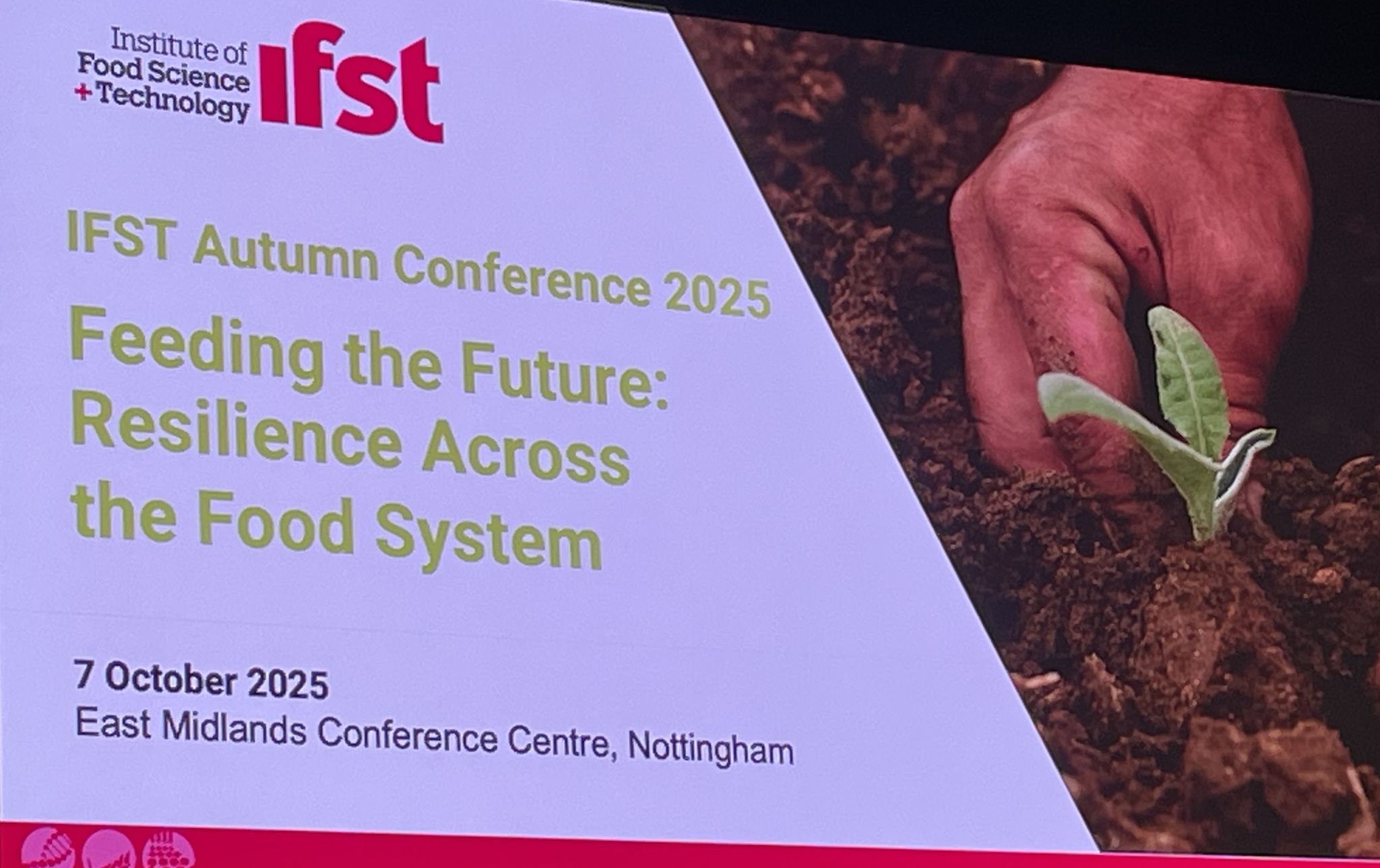
IFST Autumn Conference 2025: Resilience, Innovation, and Connection
Last Tuesday, I had the pleasure of attending the Institute of Food Science and Technology (IFST) Autumn Conference at the East Midlands Conference Centre in Nottingham along with other members of the MorePeople Technical team.
It was a fantastic day filled with learning, discussion, and reconnection with colleagues from across the food industry. This year’s central theme — the resilience (or lack of it) of the UK food system — couldn’t have been more relevant, given the complex challenges our sector continues to face.
A Historic Milestone for IFST
The conference opened with a major announcement: on 1 October 2025, the Institute of Food Science and Technology was officially granted a Royal Charter by King Charles III, marking its transition to the Chartered Institute of Food Science and Technology (CIFST).
This prestigious recognition - part of a transition expected to take around a year - reinforces the legitimacy, independence, and public trust of the food science and technology profession. It also signals the Institute’s enduring commitment to excellence and integrity within the sector.
A huge congratulations to everyone involved in achieving this historic milestone!
Exploring Resilience and the “Polycrises”
Professor Tim Lang, from the Centre for Food Policy, delivered a compelling session on the nature of resilience within our food system. He reminded us that resilience cannot be delivered by government policy alone - it must be built from within our communities and supply chains.
Professor Lang spoke about the growing need to prepare for multiple, simultaneous shocks - the so-called “polycrises” - and even raised the possibility of the weaponisation of the food chain. His message served as a stark reminder of just how interconnected, and therefore vulnerable, global food systems have become.
Inspiring the Next Generation
Robin Leaper and Jessica Gray introduced the new IFST Outreach Toolkit, designed to inspire young people to pursue careers in food science and technology. As someone working in recruitment within the food sector, I found this particularly inspiring. Attracting and developing future talent is vital if we want to build a resilient and innovative industry for the long term.
The Top 10 Risks to UK Food
Kathryn Reynolds, from the Institute of Grocery Distribution (IGD), shared the top 10 risks to UK food, highlighting where our collective focus must lie:
Climate Change
Geopolitics
The Economics of the Food System
Agricultural Challenges
Water
Disease
Labour and Skills
Biodiversity Loss
Opaque Supply Chains
Cybersecurity
These challenges are complex and interlinked. Kathryn’s presentation, paired with IGD’s scenario modelling, made it clear that our industry must not only anticipate these risks but also act decisively to mitigate them.
Innovation, Sustainability, and the Future of Food
Sarah Wynn from ADAS gave a fascinating insight into Scope 3 carbon metrics, reminding us that the global food system contributes around 26% of total greenhouse gas emissions, with 80% of that coming from agriculture. Her session reinforced the importance of robust measurement and collaboration in driving meaningful carbon reduction.
Sonalika Jain, from RSSL, explored the work of the Novel Foods Expert Network (NFX) - an initiative providing guidance and roadmaps for registering novel foods in the UK. Her talk highlighted the growing innovation opportunities around emerging ingredients and technologies.
Meanwhile, Gareth Payne from Adamo Foods offered a glimpse into the future of sustainable protein with an update on their pioneering mycelium-based meat alternatives. Their focus on developing whole-cut muscle substitutes shows just how fast the plant-based space is evolving.
Simon Baty from Innovate UK / Business Connect spoke about Harvest Eye precision‐technology / machine vision system that is “powered by advanced AI” to automatically count, size, and analyse produce during harvesting, this was especially interesting as I been to see a client a couple of weeks ago that was using this technology.
Looking Ahead
The day concluded with a thought-provoking panel discussion on communication and the IFST’s future direction, chaired by the ever-engaging Judith Batchelar OBE. She was joined by Sarah Wynn, Barbara Bray MBE, Elaine Hindal, and Kelly Vere MBE - an inspiring panel of leaders who reminded us of the power of collaboration and shared purpose.
Final Thoughts
Events like IFSTAC25 are a reminder of why I’m proud to work in and alongside such a passionate and forward-thinking industry.
From resilience to innovation, it’s clear that the greatest strength of the food sector lies in its people - their collaboration, creativity, and unwavering drive to make things better.
